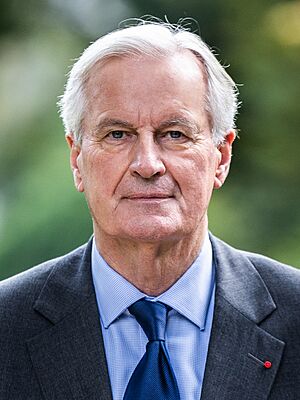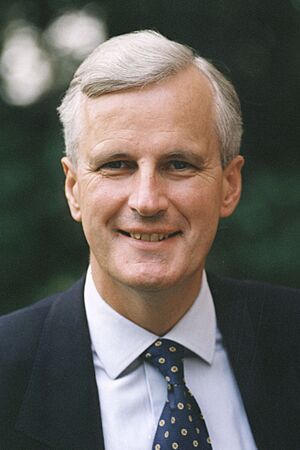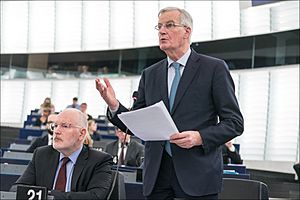Michel Barnier facts for kids
Quick facts for kids
Michel Barnier
|
|||||||||||||||||||||||||||||||||||||||||||||||||||||||||||||||||||||||||||||
|---|---|---|---|---|---|---|---|---|---|---|---|---|---|---|---|---|---|---|---|---|---|---|---|---|---|---|---|---|---|---|---|---|---|---|---|---|---|---|---|---|---|---|---|---|---|---|---|---|---|---|---|---|---|---|---|---|---|---|---|---|---|---|---|---|---|---|---|---|---|---|---|---|---|---|---|---|---|

Official portrait, 2024
|
|||||||||||||||||||||||||||||||||||||||||||||||||||||||||||||||||||||||||||||
| Prime Minister of France | |||||||||||||||||||||||||||||||||||||||||||||||||||||||||||||||||||||||||||||
| In office 5 September 2024 – 13 December 2024 |
|||||||||||||||||||||||||||||||||||||||||||||||||||||||||||||||||||||||||||||
| President | Emmanuel Macron | ||||||||||||||||||||||||||||||||||||||||||||||||||||||||||||||||||||||||||||
| Preceded by | Gabriel Attal | ||||||||||||||||||||||||||||||||||||||||||||||||||||||||||||||||||||||||||||
| Succeeded by | François Bayrou | ||||||||||||||||||||||||||||||||||||||||||||||||||||||||||||||||||||||||||||
|
|||||||||||||||||||||||||||||||||||||||||||||||||||||||||||||||||||||||||||||
|
|||||||||||||||||||||||||||||||||||||||||||||||||||||||||||||||||||||||||||||
| Personal details | |||||||||||||||||||||||||||||||||||||||||||||||||||||||||||||||||||||||||||||
| Born |
Michel Jean Barnier
9 January 1951 La Tronche, France |
||||||||||||||||||||||||||||||||||||||||||||||||||||||||||||||||||||||||||||
| Political party | LR (2015–present) | ||||||||||||||||||||||||||||||||||||||||||||||||||||||||||||||||||||||||||||
| Other political affiliations |
UDR (1967–1976) RPR (1976–2002) UMP (2002–2015) |
||||||||||||||||||||||||||||||||||||||||||||||||||||||||||||||||||||||||||||
| Spouse |
Isabelle Altmayer
(m. 1982) |
||||||||||||||||||||||||||||||||||||||||||||||||||||||||||||||||||||||||||||
| Children | 3 | ||||||||||||||||||||||||||||||||||||||||||||||||||||||||||||||||||||||||||||
| Relatives | Éric and Nicolas Altmayer (brothers-in-law) René Altmayer (grandfather-in-law) Victor Joseph Altmayer (great-grandfather-in-law) |
||||||||||||||||||||||||||||||||||||||||||||||||||||||||||||||||||||||||||||
| Alma mater | ESCP Business School | ||||||||||||||||||||||||||||||||||||||||||||||||||||||||||||||||||||||||||||
| Occupation | |||||||||||||||||||||||||||||||||||||||||||||||||||||||||||||||||||||||||||||
| Signature | |||||||||||||||||||||||||||||||||||||||||||||||||||||||||||||||||||||||||||||
Michel Jean Barnier (born 9 January 1951) is a French politician. He served as the Prime Minister of France from September to December 2024. Before this, he held many important roles in both French and European politics.
Barnier was a member of several political parties in France, including the RPR and LR. He worked in the French government as a minister from 1993 to 2009. He also played a big part in the European Union (EU). He was a European Commissioner from 2010 to 2014. From 2016 to 2021, he was the EU's main negotiator for Brexit, which was when Britain left the European Union.
In 2021, Barnier tried to become a candidate for the French presidential election but did not win his party's nomination. In September 2024, President Emmanuel Macron chose him to be the new Prime Minister. At 73 years old, Barnier became the oldest person to hold this position in France's modern history.
His time as Prime Minister was short. In December 2024, his government lost a special vote in Parliament called a "vote of no confidence." This meant that most lawmakers did not support his government. He then resigned, and François Bayrou became the new Prime Minister. Barnier's time as Prime Minister was the shortest in the history of the French Fifth Republic.
Barnier is known as a Gaullist conservative who supports the idea of a strong Europe. He has spoken about making rules for immigration and improving France's economy.
Contents
Early Life and School Days
Michel Jean Barnier was born in La Tronche, a town in the French Alps, in 1951. His family had a strong belief in Gaullism, a political idea from Charles de Gaulle. His father, Jean Barnier, worked with leather and textiles. His mother, Denise Durand, was involved in community work.
When he was young, Barnier was a scout and sang in a choir. He studied at the ESCP Business School and finished in 1972. During his studies, he was classmates with Jean-Pierre Raffarin, who later also became a Prime Minister. He was also part of a student group that helped prepare young people for political life.
Starting a Political Career
Michel Barnier began his career working for different government ministers in the 1970s. In 1978, at just 27 years old, he was elected to the National Assembly. This is like being a member of parliament in France. He represented the area of Savoie until 1993.
In 1981, Barnier voted to end the death penalty in France. In 1982, he became the youngest president of the local council for Savoie. He also helped organize the 1992 Winter Olympics in Albertville in 1992.
Serving France in Government
Barnier first joined the French government as the Minister of the Environment in 1993. Later, in 1995, President Jacques Chirac made him the Minister for European Affairs. This role involved working on France's relationships with other European countries.
He also served as the European Commissioner for Regional Policy from 1999 to 2004. After that, he became the Foreign Minister of France until 2005. From 2007 to 2009, under President Nicolas Sarkozy, he was the Minister of Agriculture.
Working for the European Union
In 2006, Barnier advised José Manuel Barroso, who was the head of the European Commission. He suggested creating a European force to help in emergencies. He also helped write parts of the Treaty of Lisbon, which is an important agreement for the European Union.
In 2010, Barnier became a European Commissioner for the Internal Market and Services. In this job, he worked on making rules for banks and financial services across Europe. He also helped create the "banking union" and worked on the "digital single market." These efforts aimed to make it easier for businesses and people to operate across EU countries.
In 2014, he tried to become the President of the European Commission but was not chosen. He continued to advise the European Commission on defense policy.
Leading Brexit Talks
In 2016, Michel Barnier was chosen to be the European Commission's chief negotiator for Brexit. This was a very important job, as he had to work with the United Kingdom on how it would leave the European Union.
From 2019 to 2021, he led the team that worked on the relationship between the EU and the UK after Brexit. He was the main person negotiating the trade deal between the two sides in 2020.
Running for President

In 2021, Barnier decided to run for president of France in the 2022 French presidential election. He launched his campaign in August 2021. During his party's selection process, he came in third place. He then supported another candidate, Valérie Pécresse. After this, he stepped back from politics for a few years.
Becoming Prime Minister
In the summer of 2024, France held new elections for its parliament. After these elections, the previous Prime Minister, Gabriel Attal, resigned. On September 5, 2024, President Emmanuel Macron appointed Michel Barnier as the new Prime Minister of France.
Barnier was the oldest person to become Prime Minister in France's modern history. Some people saw him as a choice that could bring different political groups together. He faced big challenges, like forming a new government and managing France's national budget.
Challenges as Prime Minister
Barnier's government had to deal with a parliament that was divided into three main groups. These groups included the leftist New Popular Front, President Macron's centrist group called Ensemble, and the far-right National Rally.
Many political leaders reacted to Barnier's appointment. Some, like Marine Le Pen from the National Rally, showed cautious support. Others, especially from the New Popular Front, did not agree with his appointment. They even called for protests against the decision. About 110,000 people took part in these protests across France.
On December 2, 2024, Barnier used a special rule in the French Constitution to pass the budget for social security without a vote in parliament. This led to other political groups filing "motions of no confidence" against his government. On December 4, most lawmakers voted against his government, and it was forced to resign. This was the first time a French government had lost a vote of no confidence since 1962.
What Michel Barnier Believes In
Michel Barnier is known as a conservative politician who is very patriotic. He follows the ideas of Charles de Gaulle, a famous French leader.
Views on France's Future
After becoming Prime Minister in 2024, Barnier said that France needed to focus on immigration, its public finances (how the government manages money), and strengthening its industries and farms. His main goals as Prime Minister included improving education, security, and controlling immigration.
During his 2021 presidential campaign, Barnier suggested holding a public vote on how to manage immigration in France. He spoke about wanting to pause non-European immigration for a few years. He also proposed making it harder for families to reunite and for foreign students to stay in France.
On economic matters, Barnier's ideas were similar to President Macron's. He supported reducing taxes and making fewer rules for businesses. He also suggested raising the retirement age and changing rules for social support programs.
European and Global Outlook
Barnier is a strong supporter of the European Union and believes in working closely with other European countries. He also supports NATO, a group of countries that work together for defense. He has shown support for Ukraine in its conflict with Russia.
Even though he is known as pro-European, some people noticed that during his presidential campaign, he sometimes sounded like he had doubts about the EU. This was different from his earlier views.
Personal Life
Michel Barnier has continued his involvement with the International Olympic Committee since helping organize the 1992 Winter Olympics. He is also part of a group called Friends of Europe, which is a research organization in Brussels. In 2021, he wrote a book called My Secret Brexit Diary, sharing his experiences during the Brexit negotiations.
He married Isabelle Altmayer, a lawyer, in 1982. They have three children together. In October 2024, Barnier had surgery for a neck issue.
Awards and Recognition
Michel Barnier has received many awards and honors from France and other countries for his public service.
National honours
- Officier of the Legion of Honour
- Commander of the Order of Agricultural Merit
- Commander of the Order of Maritime Merit
Foreign honours
- Knight Commander of the Order of Merit of the Federal Republic of Germany
- Commander's Cross of the Order of Merit of the Republic of Poland
- Grand Cross of the Order of Prince Henry
- Grand Officier of the Military Order of Christ
- Commander of the Order of the Star
- Cross of the Order of Merit of the Sovereign Military Order of Malta
- Medal of the Oriental Republic of Uruguay
See also
 In Spanish: Michel Barnier para niños
In Spanish: Michel Barnier para niños
 | Selma Burke |
 | Pauline Powell Burns |
 | Frederick J. Brown |
 | Robert Blackburn |



